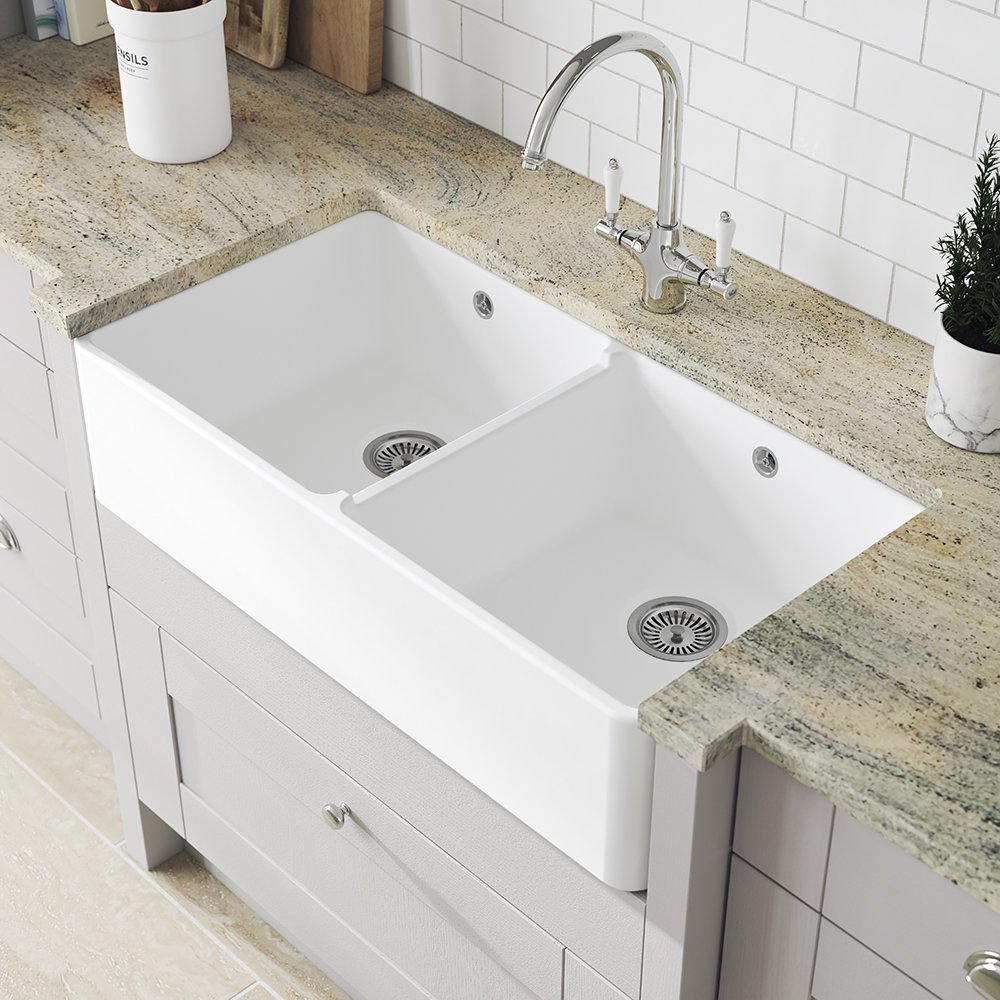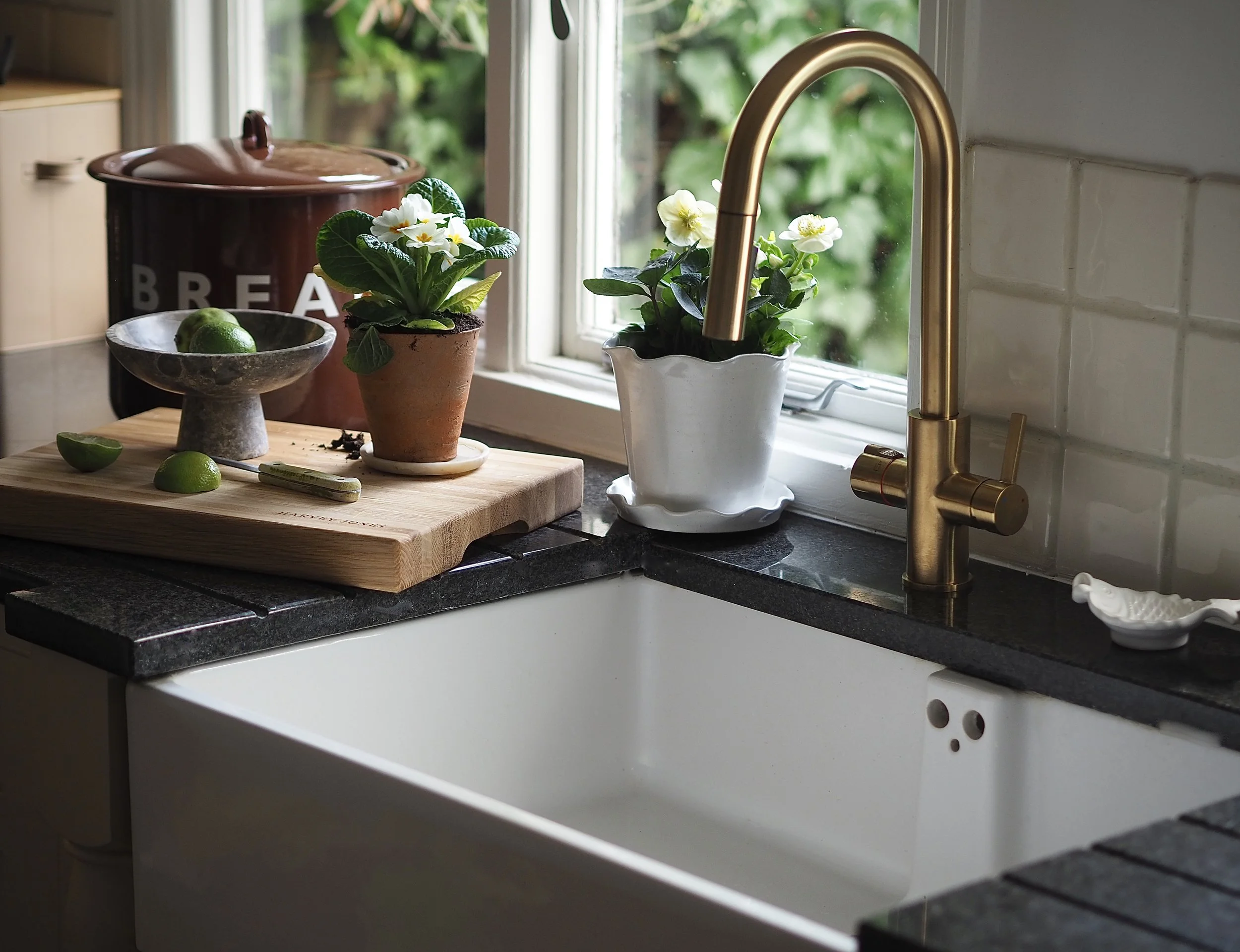How to Select the Right Kitchen Sink Style for Your Home
Shaker kitchen from Olive & Barr
If you are renovating an older home, building a new kitchen extension, or simply updating your existing kitchen, one of the most important things to consider is just what type of kitchen sink you should install for washing dishes, preparing food or filling vases of water for home floral arrangements. There are multiple kitchen sink styles available in an array of sizes and materials and you should choose the right one for you based not only on design but also practicality, budget and lifestyle.
GROHE Minta SmartControl Dual Spray Sink Mixer.
Kitchen sinks made from ceramic or steel are commonplace as these are often the most affordable options which are easy to keep clean. However, you can also purchase kitchen sinks made from materials such as resin, iron, marble or quartz. Once you have decided on your preferred material, compare sink styles to work out what type would suit your home best.
Kitchen sink types:
Top-mount sink
Undermount sink
Apron / Farmhouse / Butler sink
Double-bowl kitchen sink
Low-divide kitchen sink
Integrated sink
Drainboard sink
Kitchen by Et Lorem
Before purchasing a kitchen sink, think about its placement within the room and the type of worktop that it will be combined with. Its position within the kitchen and the other materials and colours that it is paired with within the space should influence the type of sink you purchase. If possible, take along a photo of your kitchen and a sample of your worktop material with you when you look for sinks to help with visualising the end result. As the kitchen sink is one of the hardest working areas of the home and is used regularly, you should also consider having home warranty plumbing so that you do not need to concern yourself with any common plumbing issues that may occur.
Top-Mount Sink
Also popularly known as a drop-in sink or self-rimming sink, this is one of the most common types of sink you can find on the market (which also makes it one of the most budget-friendly). With an overlapping edge, this sink sits within a pre-cut hole within a surface and due to this easy-to-install process, it’s often favoured by DIYers who are taking on a kitchen installation themselves. Once the sink is in place, the rim of the sink is sealed to the counter to secure it and to stop any dirt or crumbs from accumulating in the join.
A top-mount sink in this on-trend yellow kitchen. Image Credit: Huckleberry
Undermount Sink
Subtle and discreet, undermount sinks are almost ‘hidden’ as they are attached underneath the countertop and have no visible edge or rim. Undermount sinks are favoured if you do not want your sink to be a focal point within your kitchen design and desire an ultimately modern, sleek and seamless look. They are also good if you want to install a particular material that is easy to clean (such as steel) but do not want this material ‘on show’. If you are investing in a statement worktop with a detailed vein or terrazzo pattern, an undermount sink would be a good choice so as not to distract or ‘break up’ the surface detailing.
An undermount sink alongside GROHE’s Eurosmart Two Handled Kitchen Mixer
Apron / Farmhouse / Belfast sink
Unlike the discrete nature of an undermount sink, a farmhouse sink is a key feature within a kitchen as the front of the sink is entirely visible. Popular for its aesthetic appeal, a farmhouse or Belfast sink is often more expensive to purchase due to the nature of its design. However, as the farmhouse sink offers a less polished and more rustic look, older Belfast sinks can often be located for sale in salvage and reclamation yards which can then be polished up to look like new (while still retaining an antique charm). Belfast sinks also tend to be large and spacious, making them perfect for washing up large pans or steel bottle containers.
This Belfast sink pairs perfectly with the oiled worktop. Image credit: Olive & Barr
Double-bowl kitchen sink
If you have the space, double-bowl sinks are great for hard-working kitchens as they offer the ability to combine food preparation and the cleaning of serveware and tableware at the same time. However, the combination of two bowls rather than one single large bowl means less space to wash generous-sized pots and saucepans used to cook big meals, so it might not be appropriate for homes with larger families who all eat together.
Sherwood Double Belfast Sink from Benchmarx
Low-divide kitchen sink
If a double-bowl sink is appealing but you are concerned about washing larger serve or cookware, a low-divide sink might be your answer. A low-divide sink has two bowls but the wall that separates them only rises halfway up, allowing for ease of movement between the two areas. The downside to low-divide sinks is that they are not as commonplace or as readily available as other types of sinks, so this may limit your options and preference for a certain look or material.
Low-divide sink from Blanco.com
Integrated
Depending on the type of kitchen countertop that you select, you may be offered a perfectly seamless, integrated sink composed of the same material as your work surface. Your sink will ultimately be customised and unique to your kitchen due to it needing to be fabricated by your worktop manufacturer (Silestone by Cosentino and Fenix both offer integrated sink options). An integrated sink offers the most high-end, flawless look for a modern kitchen design; they are also much easier to keep clean than separate sinks and worktops, as there are no joins or sealed edges. Consult a good quality plumber here to install a seamless, integrated sink.
Silestone Integrity Sinks from Cosentino
Drainboard sink
If practicality is at the core of your kitchen scheme, drainboard sinks combine a small sink with an attached drainboard area that channels dripping dishwater back into the sink to be disposed of efficiently. A drainboard sink is a good option for more compact spaces where there is no dishwasher, or for single occupants who tend to hand wash only a small number of items after a meal.
Vellamo Designer 1 Bowl Matt Black Comite Composite Kitchen Sink & Waste With Reversible Drainer from Tap Warehouse













